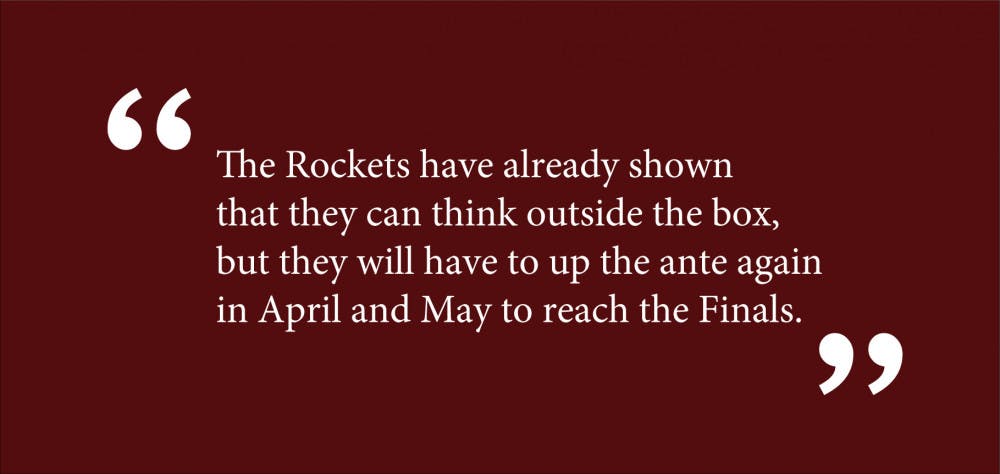Four weeks ago, the Houston Rockets decided to alter their roster dramatically after underperforming for most of this NBA season. They traded starting center Clint Capela to the Atlanta Hawks as part of a four-team trade, ultimately receiving forward Robert Covington in exchange. The move signaled the Rockets’ choice to play “small ball,” starting no one taller than 6-foot-7. At the time, many questioned Houston for the decision. After all, Capela had been a mainstay in the Rockets’ starting lineup for several seasons, and though the team had won two games playing small ball after Capela suffered a heel injury, it was widely assumed that the Rockets would need the center long-term. Houston disagreed — and so far, the Rockets have been proven correct. Since Capela’s injury, Houston has amassed an impressive 10-3 record, gaining ground on the top teams in the Western Conference. So why has this unconventional strategy paid off to such a great extent?
The absence of Capela has unlocked guard Russell Westbrook. With Capela hanging around the paint in Houston’s half-court offense, Westbrook did not have enough room to operate on his drives and struggled to find success. He looked hesitant and was settling for too many three-pointers, which was certainly not ideal since he was shooting 25.3 percent on long-range attempts. Now, without Capela, the Rockets have more room when going to the basket — Westbrook often needs to beat just one defender to get a layup. Since the All-Star break, the point guard is averaging 30.6 points, 7.4 rebounds and 6.0 assists per game on 55.7 percent shooting, finally regaining his form.
The insertion of the newly acquired Covington into the lineup has paid dividends too, giving the Rockets yet another three-point shooter. While Capela excelled at dunking lob passes from James Harden and playing in the pick-and-roll, he could not handle the ball or shoot from outside, allowing other teams with talented paint defenders to shut him down. But now, everyone on the floor for Houston is dangerous from behind the perimeter, which means every opposing player must cover the maximum amount of ground on defense. Over their last 13 games — since they went small — the Rockets rank second in the NBA in offensive rating with a 116.6 mark, up from their overall season number of 113.9.
Meanwhile, on the other side of the ball, the team’s defense has not declined after the loss of Capela. While the Rockets may not be tall, they are certainly stout on the defensive end. Between P.J. Tucker (playing center despite being 6-foot-5), Harden and Covington, Houston has plenty of players who fight against post-up attempts and get in the way of drives. In an overtime win against the Boston Celtics last Saturday, the Rockets made life difficult for Boston’s offense. Jayson Tatum shot just 9-27 from the floor, while Jaylen Brown and Marcus Smart combined for an 18-45 mark. Boston could not get to the bucket with regularity, as they were stymied by the Rockets’ notable upper body strength. While Capela might appear to be far more imposing in the paint than Houston’s current players, the trend is clear — the Rockets rank fifteenth in the league with a 109.6 defensive rating over the entire regular season but rank ninth with a 109.8 defensive rating over their past thirteen games without Capela. Houston has been able to neutralize the loss of Capela on the defensive end.
The roster has also stepped up to rebound at rates far better than anticipated. Covington, playing power forward, is averaging 8.4 rebounds per game since joining the Rockets. Tucker has enjoyed big performances on the glass — he collected 13 rebounds (six of them offensive boards) in Houston’s one-point win over the Celtics. Thanks to the efforts of Houston’s undersized frontcourt and the rebounding abilities of guards Westbrook and Harden, the Rockets have kept close enough pace with opponents in rebounding to secure victories.
Of course, the playoffs will ultimately determine the success of this small ball experiment, and the Rockets will have to face some of the premier big men in the league. The Los Angeles Lakers and Denver Nuggets especially pose problems for Houston moving forward. How can the Rockets defend stars like Anthony Davis and Nikola Jokic near the basket? Davis and Jokic have no trouble in using their strong frames to out-muscle opposing players who are far bigger than Houston’s current players guarding the paint. The Rockets have already shown that they can think outside the box, but they will have to up the ante again in April and May to reach the Finals. While playing small has certainly helped Houston improve during the regular season, the Rockets will have to prove this unusual method works when it matters most.
George Klein ’20 can be reached at george_klein@brown.edu. Please send responses to this opinion to letters@browndailyherald.com and op-eds to
opinions@browndailyherald.com.





